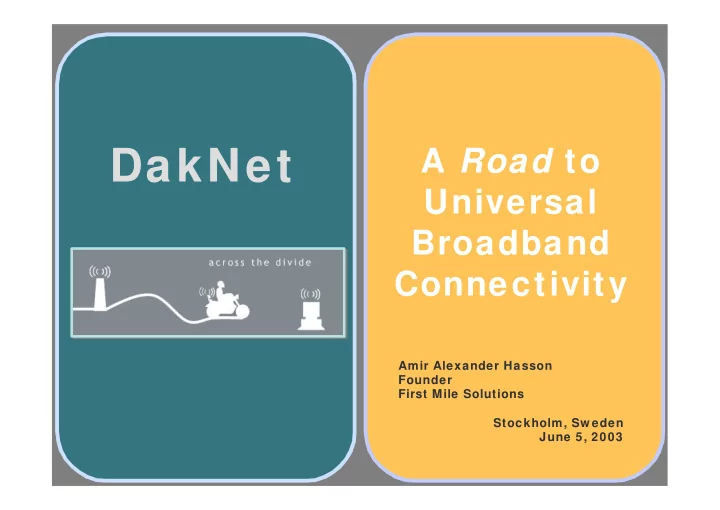

DakNet A Road to Universal Broadband Connectivity Amir Alexander Hasson Founder First Mile Solutions Stockholm, Sw eden June 5, 2003
I. Background On Rural Communications II. DakNet Concept & Applications III. DakNet-Bhoomi Pilot Overview Implementation IV. The Road to Universal Broadband Connectivity V. Considerations & Questions
• The goal is clear: Universal Connectivity • But how do we get there? The Digital • Need technology roadmap that is: Divide – Socially appropriate – Economically motivating – Financially staged – Technologically scalable
Background On Part I Rural Communications
• Wireless = leapfrogging opportunities • But what kind of wireless? – Radio links (1-100Mhz) – Cellular/ WLL – Satellite/VSAT – WiFi LAN/WAN The Wireless • Insight: Same factors driving WiFi revolution in Revolution developed world can drive a revolution in developing world: – Low cost for users and providers – East of setup, use and maintenance – Bandwidth and scalability – Spectrum delicensing
• Local entrepreneurs within developing countries will use WiFi to: – Overcome infrastructure cost barriers – Innovate and experiment with applications and content Vision – Stimulate the development dynamic for rural first mile communities – Grow the infrastructure according to first mile needs and demands, scaling up to universal broadband connectivity
• Latent demand for information and communication services • The needs of the “end- users” come first = the first mile The Rural • But need low-risk seed infrastructure to see ICT Market what is demanded – User adoption takes time – Service adoption also takes time
• ICTs introduced as shared resource • But this has drawbacks for real- time infrastructures: Asynchronous – High level of adoption required to achieve Is Sufficient cost recovery – “Who am I going to call?” problem – Shared communications infrastructure tends to be asynchronous
Part II DakNet
• Text-messaging/ email – eGovernance – eLearning – Telemedicine • Audio/video messaging Some – Communication for semi-literates Applications • Non-real time Internet searching and browsing • FTP mechanism for Village websites • VMOIP & WiFi Phones
DakNet-Bhoomi Part III Pilot Implementation
• First National Bhoomi eGovernance Initiative in India • Computerization of all land records in state of Karnataka -- Manual land records illegal • Some 500,000 land record transactions/ month • Seeking means of decentralizing its database using wireless technology
MAX2 KIOSK BUS STOP MAX1
• Integrated and implemented within one month • Total CAPEX for DakNet equipment under $200/village Pilot Test • Average data transfer per “session” = 21MB Parameters uni-directionally • Average “goodput” with & resume function was about 2.3Mb/s Performance • Maximum range varied from 200m to 1.5km • Dedicated access points address power constraints
The Road To Universal Part IV Broadband Connectivity
1: Semi-Rural WISPs WiFi “hotspots” for semi- rural communities Town • Enables affordable devices and services • Stepping stone for surrounding WiFi footprint
2: Store-and-Forw ard Wireless Town Village
3: Multi-Hop Town Village
4: Private Adoption & Meshes Town
• Lack of required talent within developing countries to develop and implement WiFi solutions • Access to required resources – customs Considerations duties • Need ugly rugged & Questions hardware for rural environment • Licensing = time and money • Role of Voice/VOIP ? • Impact on incumbent telcos?
Thank You! www.firstmilesolutions.com
Applications Layer Text messaging Audio/Video messaging Non-real-time Internet browsing DB synchronization Integration Layer Routing/naming protocol Import/Export Function Batch Processing Asynchronous DB emulation Transport Layer Intranet File Transfer MAP “Heartbeat” SMTP Internet Mail Transfer Client Web Server Network Protocol Layer TCP/IP MAC Address Restriction Ad-Hoc wLAN Wired Equivalent Privacy (WEP) Security Operating System Layer Mobile Access Point running on Linux Debian Client software runs on Windows family or Linux Physical, Hardware Layer IEEE 802.11b (11Mbps) wireless LAN cards Mobile Access Point: Custom Embedded PC Omnidirectional and Directional (terrain-dependent) Amplified Antenna Configuration
Recommend
More recommend